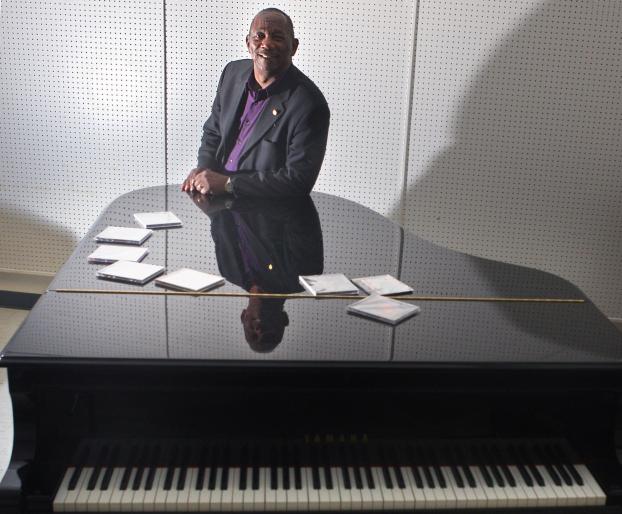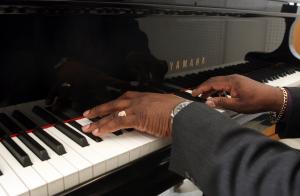 Caption: Stan L. Breckenridge poses with a piano and his CDs. Photos by Karen Tapia
Caption: Stan L. Breckenridge poses with a piano and his CDs. Photos by Karen Tapia
Musing About Musicology
Afro-ethnic Studies Lecturer-Alumnus Discusses Courses, Career
STAN L. BRECKENRIDGE was in grammar school when he took his first percussion class. The Cal State Fullerton alumnus (B.A. music-music education ’75) remembers walking by a piano decades ago and feeling its irresistible pull.
“I was drawn to the piano and needed to play it in order to soothe my musical urge,” he said.
By junior high, Breckenridge and several friends had formed The Sematics, a vocal performance group that in 1969 won a big televised talent
contest — the Super Pepsi Battle of the Bands at the Greek Theatre in Los Angeles. Then came record contracts, and Breckenridge was fueled with the desire to continue studying music and performing.
After completing his undergraduate degree, he earned master’s and doctoral degrees in musicology from Claremont Graduate University.
In 2005, he was named a Fulbright Scholar and spent a semester teaching music courses at Marie Curie Sklodowska University in Poland.
Today, he marks his 23rd year as a lecturer of Afro-ethnic studies at Cal State Fullerton. He’s about to release his eighth album, “Humanity,” and he produces albums for other recording artists.
Breckenridge recently reflected on his career and answered a few questions.
Q: What kind of music do you compose and perform?
Soul, vocal and instrumental jazz, blues and rhythm and blues are my favored styles of music to compose and perform.
Q: Why did you decide to become a teacher, and what courses do you teach?
I was inspired by my high school choir director, Lawrence Shore, and wanted to become a high school choral director as well. After high school, I left The Sematics to pursue a college education. I attended CSUF from 1970-1974 and graduated with a B. A. degree in music, with an emphasis in music education. As a music major, I developed lasting friendships with colleagues Andy Boettner and Melisa Tennile-Boettner (successful vocal coaches), Gary Murphy (music minister at a church in Palos Verde), Tom Ranier (well-known jazz composer and pianist) and Jubilant Sykes (successful vocalist and master of ceremony for this year’s Front & Center). Some of my memorable music professors at CSUF include Rita Fusek, Lloyd Rodgers, Gary Mass, Jane Paul, Howard Swan and David Thorsen. Following graduation, I had many opportunities as a performer and became fairly successful performing as a soloist (piano and voice) and with a number of funk and disco bands. After years of performing, I felt drawn to further my education and the need to articulate aspects of music through academia and performance. … Courses I teach include “African American Music Appreciation,” “Blacks in the Performing Arts” and “Pan-African Dance and Movement.”
Q: What do you want your students to get out of your classes?
Today, scholars often ponder whether African American music would have been more exuberant if Africans had journeyed to the New World of their own accord rather than as slaves. Were it not for the hideous conditions that Africans faced during the transatlantic slave trade, would styles such as spirituals, blues, and soul even exist? Perhaps not, since vocal expressions such as field hollers/cries, moaning, and groaning as protestations of harsh working conditions are all embedded in spirituals, blues, and soul. On the other hand, these sorts of expressions were commonplace in Africa. For instance, it was a common practice to invoke similar vocal articulations as a way to communicate emotions of great intensity. So, whether Africans arrived in the New World on their own accord or through slavery, these vocal articulations would probably have occurred. This quandary will perhaps never be answered. It is a fact that the early formation of American folk music was affected by the inheritance of African culture, dance, and musical activities during the African Diaspora.
African American music or music among African Americans is rooted and grounded within the fabric of American society. When one engages in a study of American society, and more specifically in American music, perhaps African American music would be a good point of departure. My goal is to inform students about the history, substance, character, and functionality of African American music, and music in general, so they can make informed decisions about African American music.
Q: Why do you love music?
Similar to what many of us have experienced with relationships, my response is: It took me a while to fully understand, but I soon realized that music loved me first. To surprisingly discover you are loved by someone/something yet unaware of your personal feeling for him, her or it can be quite an emotional and life-changing experience. And, indeed it certainly was and still is one of the most remarkable experiences in my life. To know that music — a force that has received discourse relative to arithmetic, astronomy, geometry, grammar, logic and rhetoric since antiquity; and is a phenomenon that can affect people spiritually, psychologically, physiologically, emotionally and even physically — chose me to be one of its "instruments" for expression of humanity is, in my humble opinion, one of the greatest gifts anyone can receive.
Q: What’s Next?
I am in negotiations for a 12- to 15-day tour in Poland that will occur between Thanksgiving and Christmas this year. I am also organizing another benefit concert that will occur in February 2012. I am indebted to individuals and organizations that provided financial support for me during my undergraduate years at CSUF. As a result, I make it a point to offer at least two concerts a year in order to raise scholarship support for CSUF students. In the past, these scholarships have benefited music majors (any student) and African American students.
February 2, 2011

